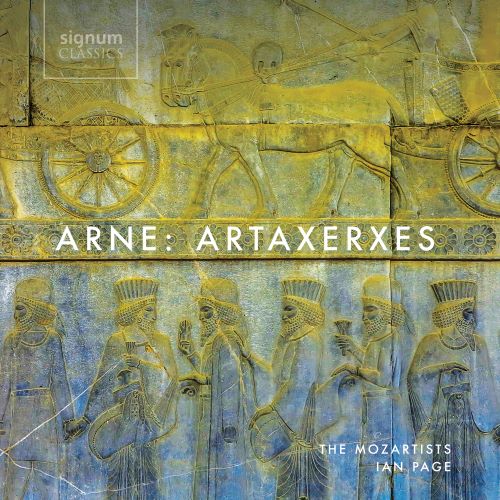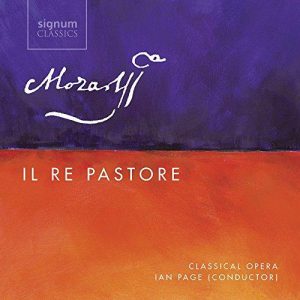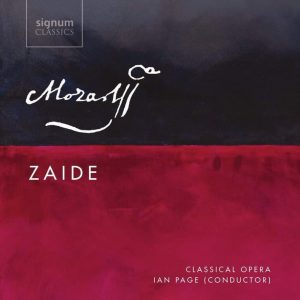“The performance is thrilling, with exemplary singing and playing.”
GRAMOPHONE
Artaxerxes was one of the most important and successful of all English operas. It remained in the London repertoire almost continuously from its première in 1762 until the 1830s, and received a documented one hundred and eleven performances before 1790.
The young Mozart almost certainly attended a performance when he came to London in 1765, and Haydn was also acquainted with the work, reportedly saying that he “had no idea we had such an opera in the English language”.
The Mozartists’ recording of Artaxerxes was selected as a Recording of the Year by Audiophile Audition and by BBC Radio 3’s CD Review, and as Disc of the Month by Opera magazine.
“With this set, Artaxerxes has well and truly come in from the cold to earn a justly honoured place in the pantheon of opera history.”
OPERA
CD 1
- Overture (Poco piu che andante – Larghetto – Gavotta) 5:13
- Recitative: “Still silence reigns around” 0:29
- No.1, Duettino: “Fair Aurora, prithee stay” 2:16
- Recitative: “Alas, thou know’st that for my love to thee” 1:13
- No.2, Air: “Adieu, thou lovely youth” 3:21
- Recitative: “O cruel parting! How can I survive?” 0:57
- No.3, Air: “Amid a thousand racking woes” 4:38
- Recitative: “Be firm, my heart” 1:26
- No.4, Air: “Behold, on Lethe’s dismal strand” 3:36
- Recitative: “Stay, Artaxerxes, stay” 0:29
- No.5, Air: “Fair Semira, lovely maid” 3:26
- Recitative: “I fear some dread disaster” 1:29
- No.6, Air: “When real joy we miss” 1:59
- Recitative: “Ye Gods, protectors of the Persian Empire” 0:36
- No.7, Air: “How hard is the fate” 4:01
- Recitative: “Whither do I fly?” 3:23
- No.8, Air: “Thy father! Away, I renounce the soft claim” 1:23
- Recitative: “Ye cruel Gods, what crime have I committed” 0:14
- No.9, Air: “Acquit thee of this foul offence” 1:27
- Recitative: “Appearance, I must own, is strong against me” 0:48
- No.10, Air: “O too lovely, too unkind” 4:24
- Accompanied recitative: “Dear and beloved shade” 0:48
- No.11, Air: “Fly, soft ideas, fly” 5:01
- Recitative: “Guards, speed ye to the tower” 0:37
- No.12, Air: “In infancy, our hopes and fears” 2:12
- Recitative: “So far my great resolve succeeds” 1:28
- No.13, Air: “Disdainful you fly me” 2:46
- Recitative: “Why, my dear friend, so pensive, so inactive?” 2:05
- No.14, Air: “To sigh and complain” 1:51
- Recitative: “How many links to dire misfortune’s chain” 1:12
- No.15, Air: “If o’er the cruel tyrant love” 3:00
CD 2
- Recitative: “Which fatal evil shall I first oppose?” 0:31
- No.16, Air: “If the river’s swelling waves” 2:34
- Recitative: “Ye solid pillars of the Persian Empire” 5:00
- No.17, Air: “By that belov’d embrace” 3:31
- Recitative: “Ah me, at poor Arbaces’ parting” 0:46
- No.18, Air: “Monster, away” 2:36
- Recitative: “See, lov’d Semira” 1:02
- Accompanied recitative: “At last my soul has room” 0:37
- No.19, Air: “Thou, like the glorious sun” 4:58
- No.20, Air: “Why is death for ever late” 2:57
- Recitative: “Arbaces! Gracious Heav’n, what’s this I see?” 1:13
- No.21, Air: “Water parted from the sea” 2:19
- Recitative: “That face, secure in conscious innocence” 0:25
- No.22, Air: “Though oft a cloud with envious shade” 3:38
- Recitative: “My son, Arbaces… where art thou retir’d?” 1:52
- No.23, Air: “O let the danger of a son” 2:15
- Accompanied recitative: “Ye adverse Gods!” 0:41
- No.24, Air: “O, much lov’d son, if death” 5:15
- Recitative: “Perhaps the King releas’d Arbaces” 1:34
- No.25, Air: “Let not rage, thy bosom firing” 4:24
- Recitative: “What have I done? Alas, I vainly thought” 0:24
- No.26, Air: “‘Tis not true that in our grief” 4:08
- Recitative: “Nor here my searching eyes can find Mandane” 1:20
- No.27, Duetto: “For thee I live, my dearest” 3:37
- Recitative: “To you, my people, much belov’d” 2:20
- No.28, Air: “The soldier, tir’d of war’s alarms” 3:33
- Recitative: “Behold, my King, Arbaces at thy feet” 2:25
- No.29, “Finale: Live to us, to Empire live” 3:36
Act One
Mandane and Arbaces are in love, but Mandane’s father, King Xerxes, has banished Arbaces from the palace. Artabanes enters with a bloody sword, having just murdered Xerxes. He exchanges swords with his son – Arbaces – and tells Artaxerxes that his father – Xerxes – must have been killed by Darius, Artaxerxes’ elder brother and heir to the throne; he offers to arrest Darius.
Artaxerxes expresses his love for Semira, Arbaces’ sister, who shrugs off the advances of Rimenes before considering how unhappy she would be were Artaxerxes to be killed.
Artabanes announces that he has had Darius executed, but Arbaces is then discovered with the blood-stained sword. He refuses to incriminate his father, leaving the other characters to contemplate his apparent guilt.
Act Two
Artabanes offers to let Arbaces escape and lead a rebellion, but Arbaces refuses. Instead, Artabanes and Rimenes plot to kill Artaxerxes, with Semira offered as Rimenes’ reward. Torn by indecision, Artaxerxes places Arbaces’ fate in the hands of Artabanes, who condemns his son to death; Artaxerxes, though, permits a stay of execution. Mandane and Semira berate Artabanes and Artaxerxes respectively for their failure to save Arbaces.
Act Three
Artaxerxes comes to Arbaces’ cell and enables him to escape. When Artabanes and Rimenes then arrive with the same intention and find the cell empty, they assume that Arbaces has already been executed; they resolve to take revenge on Artaxerxes by poisoning him as he takes his coronation oath. Meanwhile, Mandane is reunited with Arbaces, whom she thought dead.
At his coronation Artaxerxes is about to drink from the poisoned cup, but is interrupted by news that Arbaces has single-handedly quelled a rebellion led by Rimenes. Arbaces enters, and Artaxerxes offers him the cup with which to pledge his innocence. Artabanes is forced to intercept, confessing to the poison and to his previous crimes. Artaxerxes spares his life but banishes him from the kingdom, and the two couples – Arbaces and Mandane, Artaxerxes and Semira – are joyfully united.
Artaxerxes – an introduction by Ian Page
Artaxerxes was in its time one of the most important and successful of all English operas. It remained in the London repertoire almost continuously from its premiere in 1762 until the 1830s, and received a documented one hundred and eleven performances before 1790. The young Mozart almost certainly attended a performance when he came to London in 1765, and Haydn was also acquainted with the work, reportedly saying that he “had no idea we had such an opera in the English language”.
The libretto
In one respect the opera is indeed unique, in that it represents the only known attempt to write an Italianate, Metastasian opera seria in the English language. Metastasio’s original libretto was written in 1729 and first set to music by Vinci in 1730. It was subsequently set by over ninety composers, including Gluck (Milan, 1741) and J.C.Bach (Turin, 1760) – in both cases, incidentally, the composer’s very first opera – in locations ranging from Padua to Stockholm. Arne was probably already familiar with the version by Hasse, which was performed in London in 1754.
The English version of the libretto was published anonymously, but it has generally been assumed to be the work of Arne himself, as is intimated by Charles Burney’s rather caustic observation that “the number of his unfortunate pieces for the stage was prodigious; yet none of them were condemned or neglected for want of merit in the music, but words, of which the doctor was too frequently guilty of being the author.” In the preface to the printed libretto the author confesses that it is his “first attempt of the kind”, but although the text is often stilted and convoluted, especially to modern sensibilities, it nonetheless serves the music effectively, and Burney’s condemnation now seems perhaps unjustly harsh.
The composer
Thomas Arne was born in 1710 at the Crown and Cushion, King Street, Covent Garden, the son of an upholsterer and coffin-maker. He is best known today as the composer of “Rule, Britannia!”, but his output was immense. His settings of Comus (1738), Alfred (which includes the original setting of “Rule, Britannia!”) and The Judgement of Paris (both 1740) established him as the leading English theatre composer of his day, and he also enjoyed great success with the songs he wrote for Shakespeare’s The Tempest, As You Like It and Twelfth Night. After he was appointed resident composer at Drury Lane in 1744, though, his popularity and productivity quickly waned, and he was not to have another major success for nearly twenty years. Then, just as suddenly, he had three triumphs in as many years, with Thomas and Sally (1760), Artaxerxes and Love in a Village (both 1762). His greatest critical success was probably his 1761 oratorio Judith, but it never achieved the success of Artaxerxes, whose fusion of opera seria in the florid Italian style sung in English proved hugely popular with singers and audiences alike.
Arne suffered growing financial troubles during his final years, although he wrote some of his best works during this time, including the Shakespearean Ode (1769). He became seriously ill in late 1777, and died on 5 March 1778 in Bow Street, Covent Garden.
The first performance
Artaxerxes received its first performance on 2 February 1762 at Covent Garden. At that time the most important opera house in London was the King’s Theatre, Haymarket, which was exclusively (in both senses of the word) devoted to the performance of Italian opera; most of the composers who worked there were, like the singers, imported from Italy, although the two most successful and famous – J.C.Bach and, earlier in the century, Handel – were both German. Meanwhile Covent Garden and Drury Lane, the capital’s two other main theatres, performed English operas in an era when there was a general dearth of local talent – Arne was by some distance the most important English composer of his age.
The cast for the first performance of Artaxerxes was led by Charlotte Brent as Mandane and Ferdinando Tenducci as Arbaces. Charlotte Brent (1735-1802) was the most celebrated English singer of her time. She had received a rapturous reception at her debut as Polly in The Beggar’s Opera in 1759, and was not only Arne’s long-standing pupil but also his mistress. In 1755 Arne and his wife (another singer, Cecilia Young, who had appeared in Arne’s Comus) had travelled to Ireland to introduce his student to the Dublin public, but he returned to London at the end of the season with Brent, having legally contracted to provide Young with an allowance of £40 a year. The Italian castrato Tenducci (1735-1790) had come to London in 1758, and subsequently lived and performed in England, Scotland and Ireland for almost thirty years. Unusually for a castrato, he married, but his bride’s family were so furious that they promptly kidnapped her and had the bridegroom thrown in prison. Tenducci enjoyed great fame in London, and the young Mozart made his acquaintance here and was greatly moved by his singing. Burney wrote that his performance in Artaxerxes “had a rapid effect upon the public taste, and stimulated to imitation all that were possessed of good ears and flexible voices”, and he achieved more lasting recognition in Tobias Smollett’s novel Humphrey Clinker, in which Lydia Melford comments: “I heard the famous Tenducci, a thing from Italy – it looks for all the world like a man, though they say it is not. The voice, to be sure is neither man’s nor woman’s, but it is more melodious than either, and it warbled divinely, that while I listened I really thought myself in paradise.”
The title role, which unusually is one of the smaller roles, was taken by another Italian castrato, Peretti, while the three remaining roles were taken by English singers, led by John Beard (1717-1791) in the role of Artabanes. At the beginning of his career Beard had worked extensively with Handel, singing more parts under the composer than any other singer, including roles in ten of his operas and all of his English oratorios. In addition he was a very popular Macheath in The Beggar’s Opera, and sang in many works by Arne, Lampe and Boyce. In 1762 he was also the manager of Covent Garden, and his refusal to reduce prices provoked riots during a performance of Artaxerxes, which wrecked the auditorium and caused damage worth £2,000. The cast was completed by Miss Thomas in the role of Semira and George Mattocks as Rimenes.
The music
In keeping with the style of the day, the music of Artaxerxes is very much aria-dominated, with twenty-six of the twenty-eight surviving numbers being solo arias. The conventional hierarchy of roles is also maintained, with the prima donna and the primo uomo each having two arias in each act, as well as two duets together. The remaining characters all have one aria in each act, except Semira and Artabanes, who both also have a short second aria in Act One. The music ranges from a series of exquisite slow airs, such as Arbaces’ “O too lovely, too unkind” and “Why is death forever late?”, to Mandane’s three virtuosic showpieces culminating in the famous “The soldier, tir’d of war’s alarms”, which quickly became a touchstone for vocal virtuosity and which in more recent times was championed by Dame Joan Sutherland. It is also interesting to note how each character has musical features that are peculiar to that role – Artabanes’ two outer arias both follow exactly the same unusual pattern – a plaintive slow opening leading to a fiery Presto before culminating in a gentler final section – while Arbaces has a sobbing dotted motive that recurs in several of his arias but which does not appear in anyone else’s music.
Artaxerxes is also remarkable for the richness of its scoring. Arne had been the first English composer to include clarinets in his orchestra, and he uses wind instruments with great imagination and variety throughout the opera. One of the most exquisite pieces of scoring, though is for strings only. In Arbaces’ Act One aria, “O too lovely, too unkind”, violins are muted and cellos and basses pizzicato, while divided violas weave a sustained backdrop to the vocal line in a way which we might now consider to be archetypally Mozartian; indeed, this aria is merely the strongest of a number of suggestions throughout the score of Arne’s influence on the young Mozart.
Modern performances of Artaxerxes have been limited by the fact that none of the recitatives have survived; the original performing material was destroyed when Covent Garden burnt down in 1808, and, as was customary, the full score published in the 18th century had omitted all the recitatives and the finale. Subsequent 19th century performances used recitatives which were written by Henry Bishop, Covent Garden’s musical director from 1810 to 1824, but for this evening’s performance we will be performing only the music that we know with certainty is original and authentic Arne. For some time now I have in any case been toying with the possibility of giving a concert performance of an opera using a narrator instead of recitative, in an attempt to engage the audience more directly and dynamically in the unfolding of the story; Artaxerxes’ incomplete survival provides us with an ideal opportunity to experiment with this form of presentation. We very much hope that you are moved and impressed by this wonderful opera.
© Ian Page
Artaxerxes — Christopher Ainslie (countertenor)
Mandane — Elizabeth Watts (soprano)
Arbaces — Caitlin Hulcup (mezzo-soprano)
Artabanes — Andrew Staples (tenor)
Semira — Rebecca Bottone (soprano)
Rimenes — Daniel Norman (tenor)







